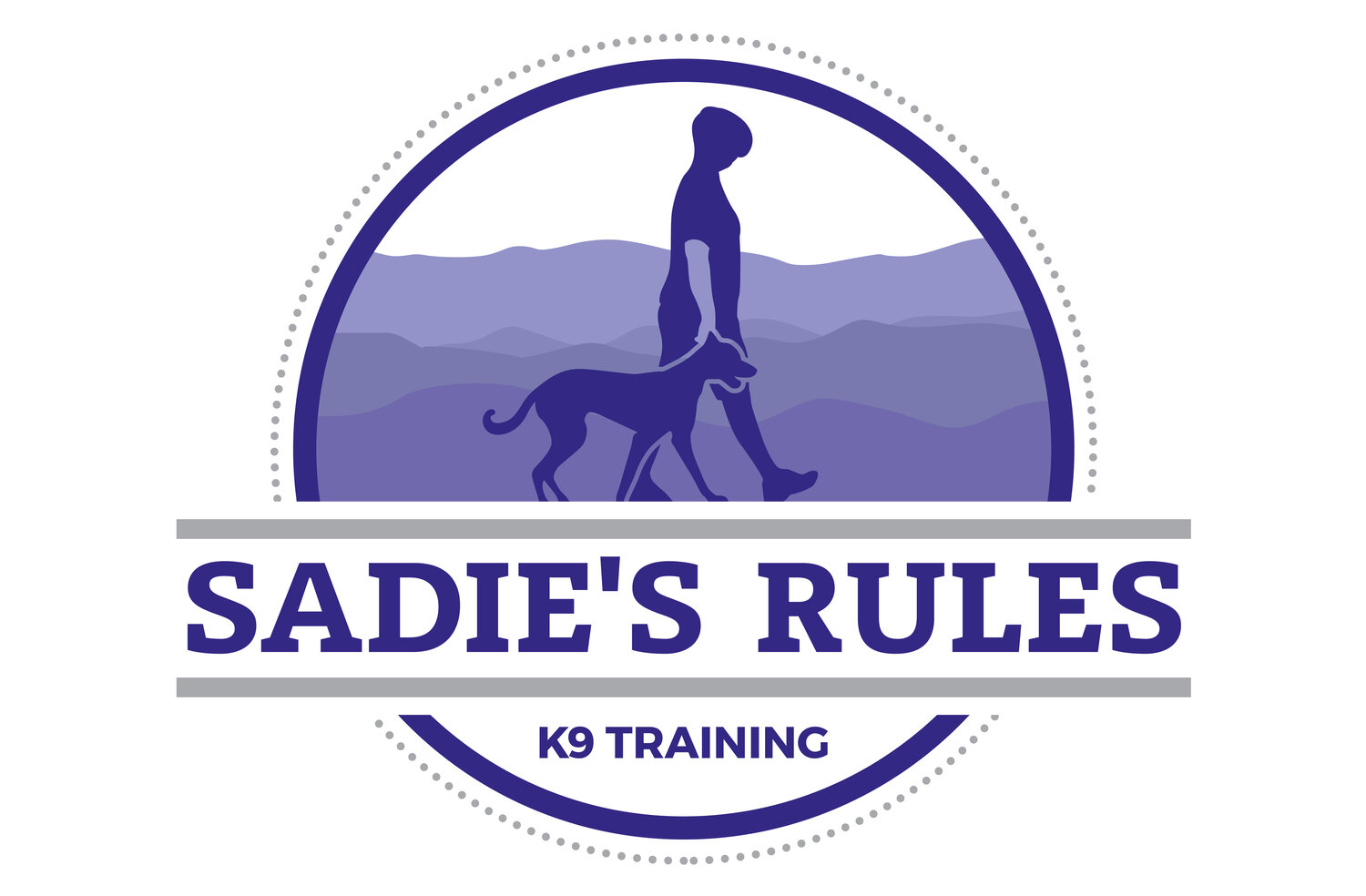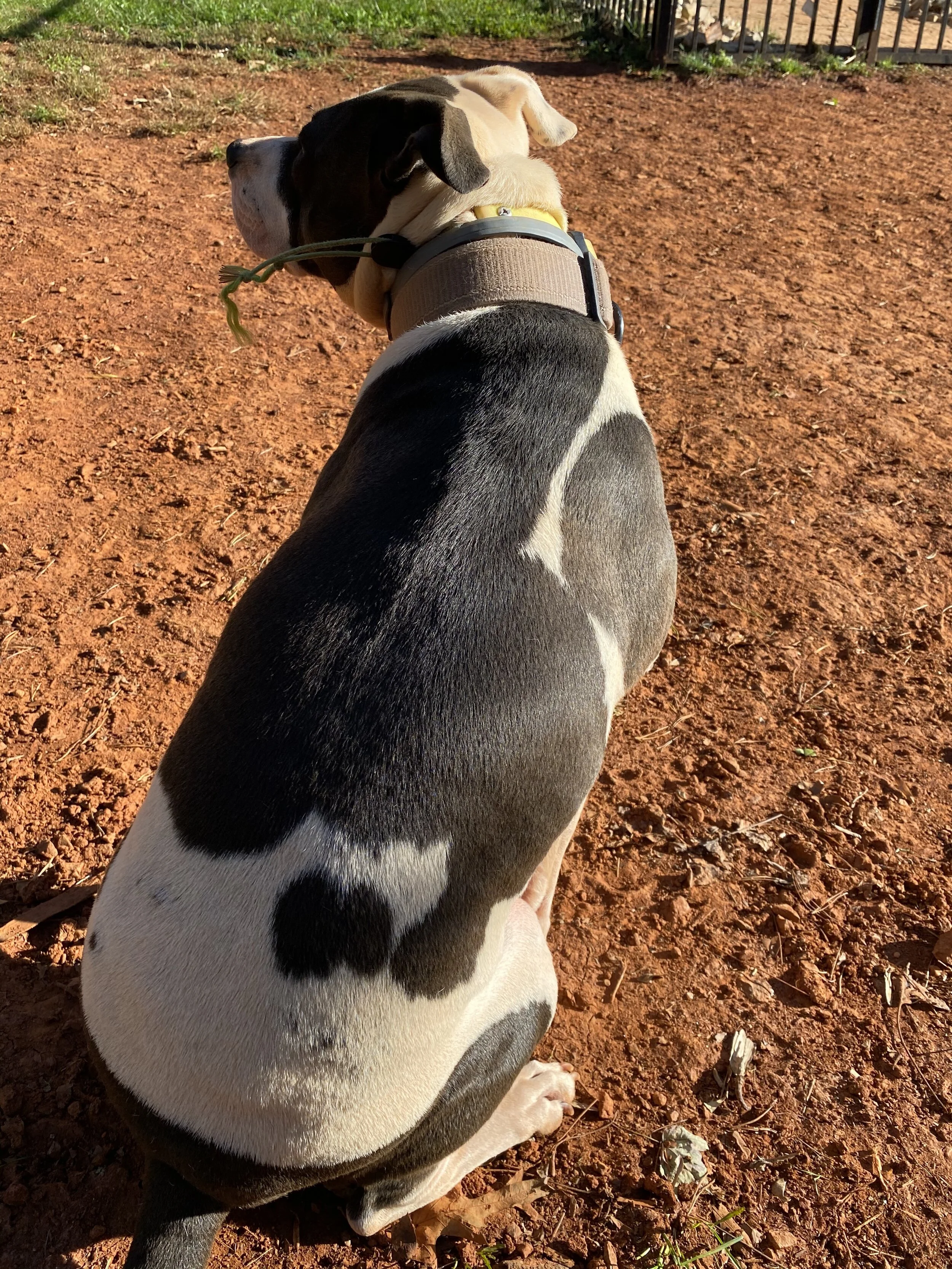The obvious reason why weight gain is a problem for dogs is because it puts them at risk for health issues. I’m not a veterinarian, plus there are tons of great articles on that subject so I won’t cover them here. What I’d like to talk about in this post is the link between diet and behavior. It’s difficult to pin down exactly how and why this happens, but it’s pretty clear to dog trainers that this is indeed a factor.
Quality Dog Food
This is my dog, Pepper. She gains weight very easily and we work hard to keep her at a healthy weight! More on her at the end of this post.
First, let’s talk about quality dog food. Personally, I have noticed a strong link between low quality kibble and behavior problems, and lower quality kibble is often high in calories, which means many (but not all!) of these dogs are overweight. Whenever a dog arrives for my board & train program with low quality kibble, one of the first things I discuss with the owner is a switch to higher quality kibble. Just like with humans, a lower quality diet contributes to a more scattered brain, so switching the dog to a healthier diet supports them as they work to develop a calmer, more balanced state of mind. Fromm’s is my personal favorite but there are many great brands out there; I strongly recommend doing some thorough research from third parties who are not paid by pet food manufacturers.
Weight Gain & Behavior Problems
Next, let’s talk about how weight gain contributes to behavior problems. Weight gain is often correlated with a low quality diet and/or poor digestion and all three of those factors can make a dog feel crappy, both physically and mentally. When dogs feel crappy, they’re more anxious and also more likely to lash out. The way this is expressed varies from dog to dog, but most dog trainers have plenty of anecdotal evidence to suggest a strong correlation between overweight dogs, poor diets, and behavior problems. Overweight dogs can also develop really unhealthy behaviors around food. Many overweight dogs are free fed (the bowl of kibble is available for long periods of time so the dog can eat whenever they want) and free feeding can contribute to resource guarding, which can become a very dangerous behavior. Not every overweight dog will develop significant behavior issues and/or issues around food, but many do.
Weight Gain & Training
Finally, overweight dogs struggle with training. I’ve trained several dogs that have had to spend the first week or so of their board & train program “getting in shape,” which really slows down their progress and limits the overall progress they make while they’re here with us. This says a LOT about what kind of shape the dog is in because this is not high energy training by any means! We are intentional about being slow and deliberate with our training because we’re teaching the dogs to slow their minds down and think in order to develop a calmer state of mind and impulse control. Even our daily walks are at a slower pace and not too long because we’re aiming to make the exercise mental as well as physical (it takes a lot of mental work to maintain the heel position). And yet, overweight dogs are often so out of shape that they still struggle with the physicality of training. Extra weight takes a big toll on a dog’s ability to move. I know it can be hard to see when you’ve got a couch potato but I’ve seen it enough to confidently say that’s true for all overweight dogs.
Do the best you can!
Finally, I don’t mean to shame anyone who has (or has had) an overweight dog—we’re all doing the best we can. In fact, the dog pictured in this blog post is my own dog! Like humans, some dogs gain weight very easily and it takes a lot of intentional effort to keep them at a healthy weight. Pepper is a dog who needs more exercise and less food than most, and sometimes that gets the better of us and we notice she has gained weight yet again. I want to end this blog post by offering up some tips and strategies we use to help Pepper lose weight:
Up her daily exercise. This is obvious, but it’s also easy to blow off. Commit to walking your dog daily! If your dog will chase a ball or play an active game like frisbee or flirt pole, make time to do that daily, too.
Get creative with her activity. You may need to get creative if your dog is not particularly active. Pepper is naturally a lazy dog who is rarely motivated to run around. We’ve found that the treadmill has been super helpful for her weight loss efforts. I have a video tutorial on how to teach your dog to walk on the treadmill here.
Decrease her food. Again, this is obvious but way too easy to overlook. We decrease Pepper’s amount of daily kibble whenever she needs to lose weight. I’ve also found that the dog food bag recommends way more kibble than she actually needs. I suggest treating the recommendation on the food bag as a starting point and adjusting based on your dog’s own individual needs. If Pepper ate the amount the dog food bag recommends, she would be significantly overweight!
Stop all treats and edible extras immediately. I promise, your dog will not be physically or emotionally hurt by a lack of treats. It’s always the human who doesn’t want to give up treating the dog—the dog is just fine. Treats include dog treats, “people” food like table scraps and pieces of food you’d usually give as treats (even if they’re low calorie treats like carrots), and any edibles like edible bones, rawhide, etc. Especially avoid high fat foods like peanut butter.
Keep playing with it until you find the combination of food and exercise that works for your dog, and don’t feel bad if it’s not as much food as you’re used to feeding her. Remember: keeping her healthy and fit is in her best interest! Lastly, I should mention that if you’ve consistently upped your dog’s exercise and you’ve decreased their food and eliminated extras and your dog still isn’t losing weight, it’s probably time for a trip to the vet. Your dog could have a metabolic issue or other issue that’s preventing them from maintaining a healthy weight.

